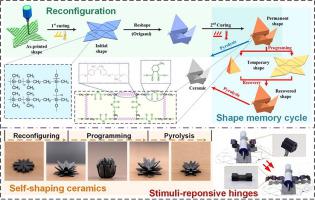Chemical Engineering Journal ( IF 15.1 ) Pub Date : 2022-12-01 , DOI: 10.1016/j.cej.2022.140655 Siyao Chen , Jinping Li , Haofan Shi , Xuliang Chen , Guo Liu , Songhe Meng , Jian Lu

|
There is growing interest in additive manufacturing (AM) of ceramics due to the feasibility of achieving geometrically complex shapes for various engineering applications. Polymer-derived ceramics (PDCs), pyrolyzed from polymeric ceramic precursors, act as a competitive material for ceramic AM with advantages such as easy processability, flexible designability, and relatively low sintering temperature. However, the functionality of preceramic polymers is far from being fully exploited, thus restricting the development and applications of 3D printed ceramics. Herein, a novel multifunctional preceramic polymer composite with reconfigurability and shape memory effect is synthesized. By tuning the material compositions, the precursor inks suitable for 4D printing are pyrolyzed into lightweight self-shaping ceramics, allowing complex geometries to be fabricated. The preceramic polymers undergo a stepwise partial-to-full crosslinking process to form interpenetrating polymer networks, resulting in reconfigurability where the as-printed parts can be transformed into shapes with higher complexity. Unlike traditional precursors with static shapes, the precursor here possesses shape memory capability (Tg ∼95 °C). During the sintering process, the 3D printed precursor could successively undergo programmable active shape transformation with a high recovery ratio (∼100%) and pyrolysis conversion into lightweight ceramics (1.05 g/cm3). By exploring the semiconducting behavior of resulting ceramics, temperature sensors leveraging the advantages of reshaping are designed to detect the surface over a wide range (25-750 °C) with good conformability. The development of 4D printed reconfigurable and programmable precursors for the construction of complex ceramics enriches both the complexity and self-shaping capability of ceramics, allowing them to be applied as smart thermistors and deployable structures.
中文翻译:

源自 4D 打印形状记忆前体的轻质几何复杂陶瓷,具有可重构性和可编程性,适用于传感和驱动应用
由于为各种工程应用实现几何复杂形状的可行性,人们对陶瓷的增材制造 (AM) 越来越感兴趣。聚合物衍生陶瓷 (PDC) 由聚合物陶瓷前体热解而成,是陶瓷 AM 的竞争材料,具有易于加工、灵活的设计性和相对较低的烧结温度等优点。然而,陶瓷前体聚合物的功能性还远未得到充分开发,从而制约了3D打印陶瓷的开发和应用。在此,合成了一种具有可重构性和形状记忆效应的新型多功能预陶瓷聚合物复合材料。通过调整材料成分,适合 4D 打印的前体墨水被热解成轻质自成型陶瓷,允许制造复杂的几何形状。前陶瓷聚合物经历逐步的部分到完全交联过程以形成互穿聚合物网络,从而导致可重构性,其中印刷部件可以转化为更复杂的形状。与具有静态形状的传统前体不同,这里的前体具有形状记忆能力(Tg ∼95 °C)。在烧结过程中,3D 打印的前驱体可以连续进行具有高恢复率(~100%)的可编程主动形状转换和热解转化为轻质陶瓷(1.05 g/cm 3)。通过探索所得陶瓷的半导体行为,利用重塑优势的温度传感器设计用于检测宽范围 (25-750 °C) 的表面,具有良好的一致性。用于构建复杂陶瓷的 4D 打印可重构和可编程前体的开发丰富了陶瓷的复杂性和自成形能力,使它们能够用作智能热敏电阻和可展开结构。


























 京公网安备 11010802027423号
京公网安备 11010802027423号